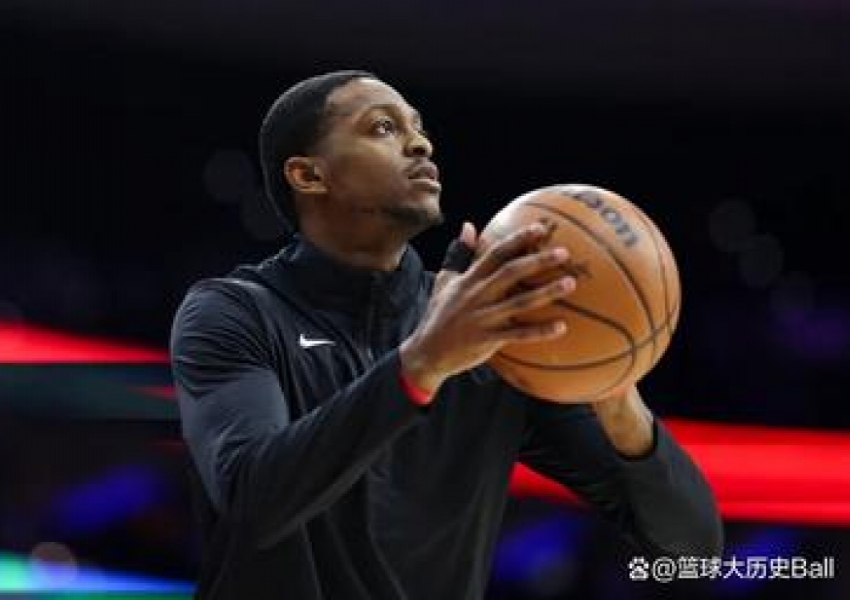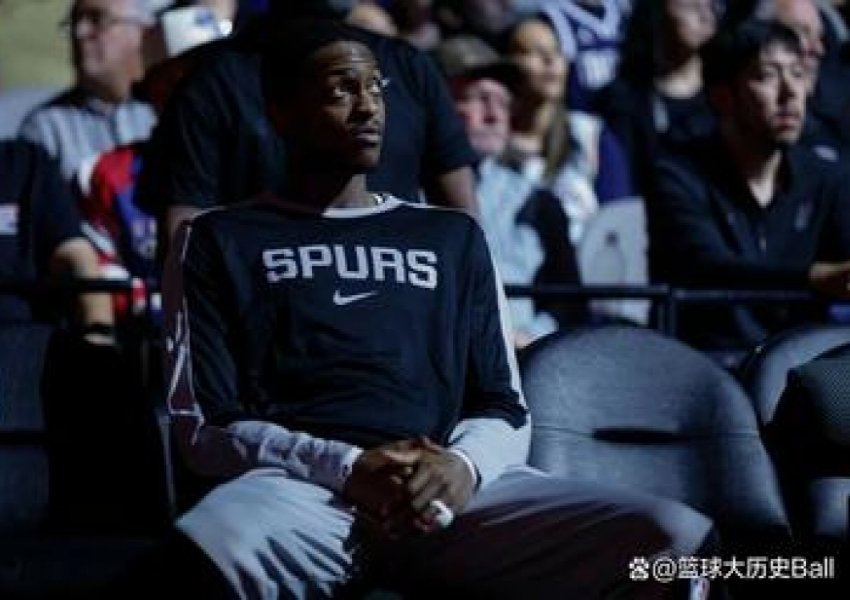$229 Million Over Four Years! Is 27-Year-Old De'Aaron Fox Worth It?
When De'Aaron Fox sat down for an interview recently and was asked if he wanted to sign an extension with the San Antonio Spurs this summer, his answer was simple and direct: “I definitely hope so.” That short sentence carries enormous weight for a franchise that gave up a king’s ransom to acquire him and now stands at a crossroads in their rebuild.

Fox, who’s entering the final year of his current five-year, $163 million deal signed with the Sacramento Kings, will become eligible for a contract extension on August 4. The maximum offer? Four years, $229 million. That’s a staggering amount for a player whose stock has quietly but steadily dropped over the past two seasons, especially in the wake of an uneven stint with the Spurs following a midseason trade.

Let’s break down what this all means—for Fox, for the Spurs, and for the long-term vision of San Antonio’s front office, which now finds itself in the precarious position of making one of the most difficult decisions in team-building: What do you pay a fringe All-Star?

The Cost of Acquisition
Before we even assess the numbers or on-court performance, let’s talk about what the Spurs gave up to land Fox in the first place. San Antonio traded four first-round picks: a top-14 protected 2025 pick from the Hornets, a top-10 protected 2025 pick from the Bulls, an unprotected 2027 Spurs pick, and an unprotected 2031 Timberwolves pick. That kind of package isn’t typically reserved for one-and-a-half years of a player’s service. The message was clear: the Spurs wanted Fox to be part of the long-term plan alongside franchise cornerstone Victor Wembanyama.
But that plan now hinges on how much they’re willing to invest—literally—in Fox's future.
Fox’s Rise and the Plateau
De'Aaron Fox’s career arc is not without its peaks. In 2023, he was phenomenal. Leading the Kings to their first playoff appearance in 17 years, Fox averaged 25.0 points, 4.2 rebounds, and 6.1 assists while being named an All-Star, making All-NBA Third Team, and winning the inaugural NBA Clutch Player of the Year award. His midrange game flourished, and he showcased the kind of poise and burst that made him look like a future perennial All-Star.
But fast forward to 2024, and the glow has dimmed.
With the Kings before being traded, Fox’s raw stats held steady—25.0 PPG, 5.0 RPG, 6.1 APG—but the efficiency dipped. His field goal percentage fell from 51.2% to 46.9%. His turnovers increased from 2.5 to 3.0 per game. And his true shooting percentage slid to 56.7%. Not catastrophic drops, but notable signs of regression.
Then came the trade—and an undeniable downturn.
In 17 games with the Spurs, Fox’s scoring dipped to 19.7 points per game. His shooting plummeted further: 44.6% overall, a dismal 27.4% from three, and a true shooting mark of 53.7%. His usage rate fell, his minutes and touches slightly declined, and the overall on-court impact was flat-out negative. With Fox on the court, the Spurs had a net rating of -7.3 points per 100 possessions. When he sat, they were a shocking +5.3.
It’s hard to spin that in a positive light.
What Went Wrong in San Antonio?
There are a few explanations—none of them fully exonerating Fox.
First, the left pinky injury. Fox played through it most of the year before finally undergoing surgery in March. But the injury had been nagging since training camp, and while it may explain part of the drop-off, it doesn’t account for the magnitude. After all, he was playing through the same issue in Sacramento.
Second, there's the ball-handling traffic jam in San Antonio. Even with Chris Paul expected to leave this summer, the Spurs are flush with initiators. Stephon Castle, who had an excellent rookie season and won Rookie of the Year, can handle the ball. And with the Spurs reportedly eyeing Rutgers guard Dylan Harper with the No. 2 pick in the draft, that logjam is only going to get worse. Fox’s usage rate dropped from 28.1% in Sacramento to 25.5% in San Antonio. His time of possession and touches both declined.
Third, and perhaps most importantly, the fit. Fox has never truly been a team-carrying superstar. Even in his best year, the Kings' real engine was Domantas Sabonis. Fox thrives as a secondary creator, a finisher, a change-of-pace weapon. But he’s not Luka. He’s not Ja. He’s not SGA. He’s not a heliocentric offensive force. And in a team like the Spurs—centered around a unicorn big man and loaded with young ballhandlers—his value proposition becomes murky.
Even his chemistry with Wembanyama wasn’t particularly encouraging. The two only played five games together, but in those minutes, the Spurs had a net rating of -2.4. For comparison, Chris Paul and Wemby shared the court in 46 games and posted a +6.2 net rating. That doesn’t mean Paul is better than Fox overall, but it does raise legitimate questions about synergy and style.
The Modern NBA Dilemma: The “Fringe Max” Player
Fox’s extension conversation puts a magnifying glass on one of the league’s most difficult personnel decisions: how to handle players who are very good—but maybe not great.
You don’t want to lose them for nothing. You can’t afford to undervalue them. But overpaying often comes with major long-term consequences.
We’ve seen this script before: Zach LaVine signed a max deal after strong-but-not-elite production. Now, the Bulls are reportedly shopping his contract like it’s radioactive. Bradley Beal got the bag—and then got shipped off with multiple picks attached just to offload his deal. Tobias Harris. CJ McCollum. Same story.
Fox is dangerously close to that category.
The Kings, notably, weren’t sold on giving Fox the full max. Reports suggest they offered 3 years, $165 million. Fox reportedly wanted the full max—and Sacramento pivoted. That should be a red flag, especially for a Spurs franchise still operating in a long-term rebuild window.
Spurs’ Future: The Clock is Ticking
The Spurs have one of the league’s brightest futures. Wembanyama looks like a generational talent. Castle is ahead of schedule. They have the No. 2 pick. They have cap space and flexibility.
But Wemby's rookie deal doesn’t last forever. Once he’s extension-eligible, the financial picture will change dramatically. The idea of using his low-cost contract to stack the roster—known as the “contract surplus window”—will vanish. Every dollar matters.
So, if the Spurs hand Fox a 4-year, $229 million extension now, they must be 100% confident that he is the co-star they want next to Wemby. Anything less is a recipe for salary cap hell, redundant talent, and wasted opportunity.
And so far, nothing about Fox's brief San Antonio stint screams "surefire max guy."
Final Thoughts
De’Aaron Fox is a very good player. He’s fast, crafty, tough in the clutch, and capable of putting up All-Star numbers. But “capable of” isn’t “consistently delivering.” His career, aside from one outstanding 2023 season, suggests a fringe All-Star at best. And $229 million isn’t fringe money.
The Spurs have to decide: is this a foundational piece worth betting the next four years on? Or is Fox just the bridge—someone to elevate the floor, stabilize the rebuild, and eventually move off of when the timeline truly crystallizes?
Paying top dollar for a maybe is always risky. And for a franchise with Victor Wembanyama on the roster, time—and precision—has never been more valuable.
In short, De’Aaron Fox is good. But $229 million good?
That’s the million-dollar—no, the 229 million-dollar—question.
Copyright Statement:
Author: focusnba
Source: FocusNBA
The copyright of this article belongs to the author. Reproduction is not allowed without permission.
Recommended Blog
- $320 Million Over Five Years: Is 28-Year-Old Devin Booker Really Worth It?
- Outplayed and Outgunned: Anthony Edwards Struggles to Match SGA’s Greatness in the Western Conference Finals
- $30 Million a Year? Is 24-Year-Old Braun Worth the Price Tag?
- Born for the Big Stage: How Immanuel Quickley Has Become a Playoff Powerhouse in 2025
- Jaw-Dropping Comebacks and Masterful Coaching: How Nate McMillan’s Pacers Are Redefining Playoff Resilience in 2025
- 28-Year-Old No.1 Pick, $40 Million Salary, Averaging Just 0.8 Points—How Much Longer Will the NBA Tolerate Him?
- Transformed and Unstoppable: Just How Dominant Is Julius Randle in This Year’s Playoffs?
- Controversy Brewing: Shai Gilgeous-Alexander’s Whistle Factor — Where Did the Timberwolves Really Lose?
- What’s Next for Westbrook? Evaluating Russ’s Season and Future in the NBA
- Back-to-Back Second-Round Struggles: Is Michael Porter Jr. on the Trading Block for Denver?